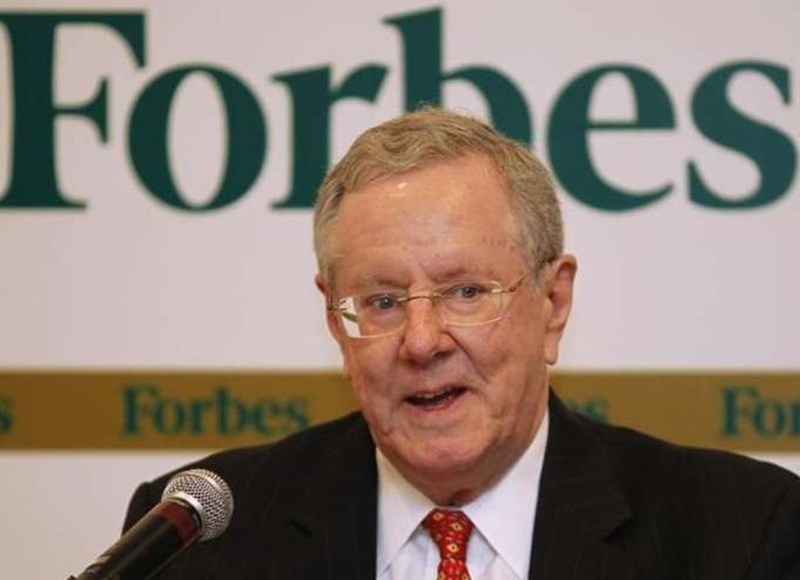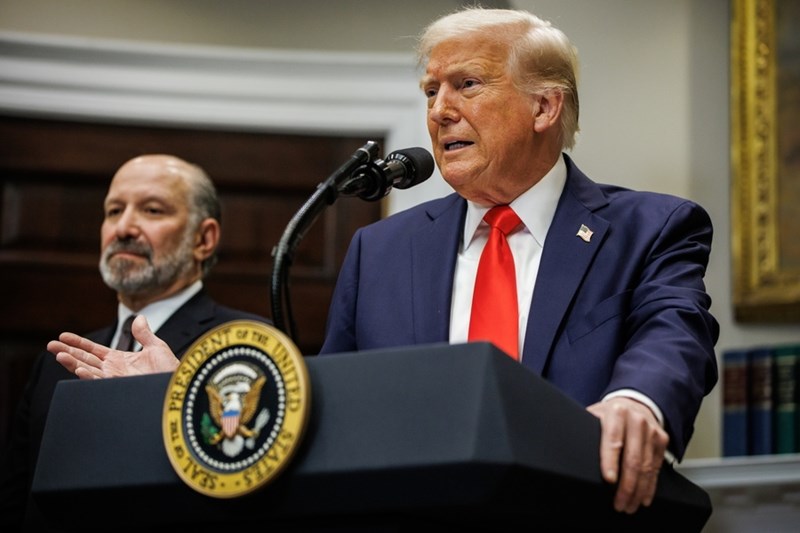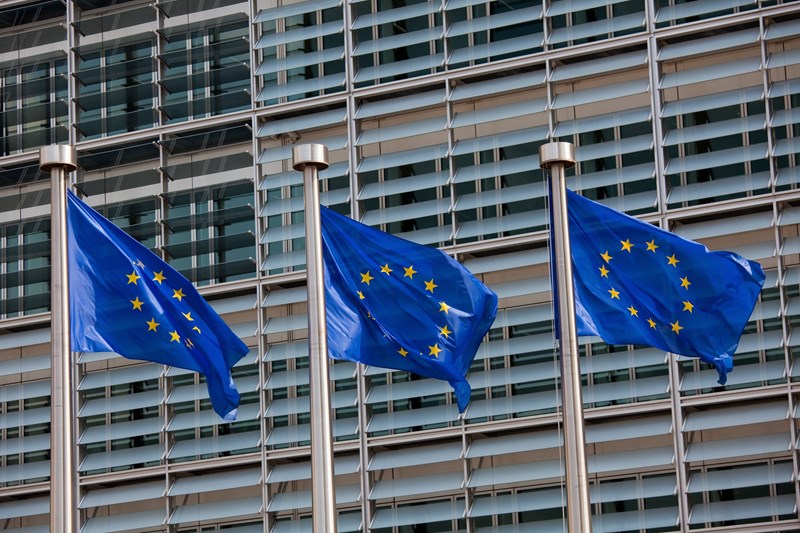Steve Forbes, 77, grandson of Forbes founder and current head of Forbes U.S., is a longtime advocate of economic freedom and a supporter of the Republican Party. What do you think about the current situation in global politics and the economy? And what advice does he offer to Ukraine to become a successful country?
Beyond the media, 77-year-old Steve Forbes is an economist — he has authored and co-authored more than 20 books, and a politician — having run for the Republican presidential nomination in 1996 and 2000.
How do you see the recipe for Ukraine's development? Forbes Ukraine contributor Petro Chernyshov and editor Tetiana Pavlushenko speak to Forbes about this topic.
Steve Forbes interview with Forbes Ukraine.
In your book "The Freedom Manifesto: Why Free Markets Are Moral and Government Is Not" you emphasize the importance of economic freedom. At what point do you think the U.S. has shifted from a free economy to a more regulated economy?
Moving away from free trade is an anomaly. Since World War II, countries have been working to reduce trade barriers. The growth of world trade after 1945 made the world a better place, in contrast to the 1930s, when protectionist sentiments prevailed.
I believe that tariff policies are temporary, because taxes harm businesses and tariffs disrupt supply chains. This is an anomaly, not a new normal. Adam Smith taught that a mutually beneficial agreement for both sides is not a zero-sum game, and countries that support free trade prosper the most.
This period will pass and in the real world it will become clear that reducing barriers, taxes and regulations is better. We should review some of the lessons.
Is globalization receding or is it simply transforming?
We live in a globalised world, and while standards are changing, the principle of open markets and the possibility of creating efficient supply chains remain unchanged.
We will find new ways of adapting to changes in international relations, especially with the Chinese market. For prosperity, large markets are essential. In the 19th century, the U.S. had a huge free trade zone between states, but now we've outgrown that market. The more we trade with other countries, the more opportunities there are for new products, services, supply chains and technological breakthroughs.
Already, we are seeing the beginnings of this phenomenon with the development of artificial intelligence, which promises a significant increase in productivity. For example, it used to cost $3 billion to approve a new drug in the U.S. and took 10-15 years, but AI could shorten this process in a few months.
Why has the world moved away from open markets, and how soon will we return to global growth?
This period will be difficult. We will see that it is better to have no taxes than to impose them, and that chaos does not lead to prosperity. It may take several years, but similar moments have happened in history. In the 1970s, the U.S. experienced decades of inflation and decline, but after Reagan's reforms, the country returned to prosperity.
Unfortunately, some lessons have not been learned. One reason for the current political turmoil is that the elites have failed to deliver on their commitments to global security and stable currencies. Money should be a fixed measure of value, like a clock with a constant 60 cents.
We have also fallen into regulatory irrationality when it comes to climate. Now we realize that the high costs for wind turbines and solar panels cannot replace natural gas.
Can you name some of the most absurd regulations in the US?
The example of an apple orchard in New York: it is governed by 5,000 rules and regulations from 17 programs. One of them requires covering the apples collected from the trees with tarpaulin when transported to the warehouse to protect them from bird droppings. But the apples have been hanging on the trees for 15 months and are washed in the warehouse. These are absurd regulations.
An absurd regulation is changing the way pizza is made in New York City due to pollutant emissions. But for a pizzeria to produce as many emissions as a private jet produces in a year, it will take 849 years.
These regulations cost the U.S. economy up to $2.5 trillion. Elon Musk and his team, whom I call "muskovites," are actively repealing the absurd regulations [ed. before Musk left DOGE]. In manufacturing, the situation is even worse: regulations cost businesses an average of $25,000 per worker, while taxes are only $5,000. No wonder manufacturers are facing a problem.
There are more and more rules everywhere. Recently, President Donald Trump eased restrictions on the flow of water in American showers.
Showers, washing machines, and dishwashers are subject to regulatory framework in the United States for crazy reasons...
Democratization and the deregulation of excessive regulation should be the basis for future economic growth in the United States. We need to stop spending money on alternative energy sources that are not only more expensive but also more harmful to the environment than natural gas or nuclear energy. For example, wind turbines produce more plastic waste than the plastic pipes they were trying to get rid of.

Europe has a massive regulatory framework. This is explained by consumer protection. How will a balance be found?
Unfortunately, in the EU, bureaucracy often demands that nothing be done until it is proven to be completely safe. This stifles innovation. If 120 years ago, the EU had to approve cars for use, this would not have happened because of concerns about accidents and fuel costs. In the US, however, innovation is allowed and laws change according to the circumstances. For example, the creation of Xerox technology led to changes in copyright laws in the 1960s.
Our difference from the people of the Stone Age is knowledge. The highest standard of living results from the creation of new knowledge, whether in a laboratory or in the market.
See the story of Margaret Rudkin. Her child had an allergy to white bread. So, she began experimenting in her kitchen and discovered whole grain bread. In 1937, he founded the Pepperidge Farm Bakery, which launched Goldfish cookies and crackers. He built this big business and sold it to Campbell's.
Rudkin's success was not the result of financial planning – it was an experiment. This is the entrepreneurial spirit that fuels innovation. Or, for example, Amadeo Pietro Giannini, who brought a revolution to the banking system, or Norman Borlaug, who started the Green Revolution (Nobel Peace Prize in 1970).
In the US, everyone has the opportunity to try out new ideas, and when they succeed, everyone benefits.
We are closely following President Javier Milei's reforms in Argentina. Do you believe that tough medicine is necessary to stabilize the economy?
President Milei does not go too far with reforms – they are radical but necessary. However, it has not replaced the peso with the dollar nor has it shut down the central bank, which is the source of the waste, as it promised during the election campaign. This would be a key step to stop the rise in inflation in the country. For example, Ecuador and El Salvador have already been dollarized, and this has worked.
Milei must also do so and implement other reforms to restore prosperity to Argentina, which was once one of the richest countries in the world.
Are there any decisions by Milei that could be useful for Ukraine?
To create a peaceful economy, it is important to reduce the size of government bureaucracy and simplify regulations. Attention should be paid to how and how difficult it is to set up a business in the country, to communicate with entrepreneurs and to remove obstacles.
Trump and the Ukrainian issue
You have long supported the Republican Party. Do you consider Trump's current economic policy effective?
I have always supported Trump's good policies and criticized those with which I disagreed. He quickly took control of the border after 10 million illegal immigrants entered the U.S., something Joe Biden hasn't done in four years. Musk's appointment for "deregulation" and budget cuts has been successful – $150 billion in spending overruns have already been found.
Duties are a form of taxation. I hope that the uncertainty around them will soon end and we will be able to focus again on clear rules.
I also believe that Trump must provide more weapons to Ukraine and act decisively to prevent Iran from becoming a nuclear state.
What are the biggest economic mistakes you see in U.S. policy toward China?
Right now we are in a real trade war with China. I hope that over time the tariffs will be applied more selectively and not generally. China is stealing our intellectual property and carrying out cyberattacks on US infrastructure. I would like the Pentagon to have countermeasures for such cases. China should know that it will pay the price for its bad deeds.
Beijing wants to control international waters, starting from the South and East China Seas, and is actively intervening in the situation in Ukraine and the Middle East. We need to solve these problems one by one, by restoring the American military, especially by using shipyards in South Korea and Japan.

What could be Ukraine's reaction in the context of trade wars?
Ukraine needs to reduce trade barriers. As the example of Switzerland shows, prosperity does not necessarily require membership in blocs such as the EU. After the war, Ukraine could become a gateway for companies, following the example of Switzerland or Singapore. Look at Slovakia, which has become a strong car manufacturer in Europe.
What is your advice to Ukrainian entrepreneurs on how to succeed globally?
Ukraine's future depends on the peaceful settlement of the war. After that, Ukraine should look to the examples of Hong Kong, Singapore and Switzerland, creating an open economy. It is important to make it easier to start a business, as in New Zealand, with low taxes and a reduction in social contributions.
Ukraine will have to pin its currency to a stable currency – either the euro or the dollar, as the Baltic countries have done. It's important to have low taxes, a stable currency, and a government that doesn't spend much. Lessons from Poland and Singapore show that Ukraine can become a high-tech hub and financial hub.
In 2023, you said that if the world lost Ukraine, it could lead to a global catastrophe. Do you still believe that?
Ukraine is critical to global security, just like Czechoslovakia was in 1938. We must not repeat the mistake made by Great Britain and France with Czechoslovakia, which led to the Second World War. That is why we need to do much more to support Ukraine in its fight against the invaders. I propose a new slogan: Make Ukraine Great Again.
There is a debate in Ukraine about opening up to labour migration. That is, to allow citizens of countries with higher GDP per capita to automatically acquire the right to reside and work in Ukraine. Is this a viable solution?
This will have to be done individually, but it is important for Ukraine to become a place where ambitious people will want to come because of the opportunities it offers. We need to avoid Europe's mistakes, as in 2015, when Angela Merkel allowed open immigration without controlling who comes and their skills.
We need smart policies to attract a skilled workforce. Also, attention should be paid to Ukrainians abroad – they could become an important resource if they see the country grow and want to return. This can stimulate internal migration and investment in Ukraine.

Give President Trump two pieces of advice.
Let's start with the economy and tariffs: when it comes to large tax breaks, it is important to maintain their effectiveness.
As for Ukraine and Iran: With Ukraine, Putin reacts only by force. The U.S. has thousands of A-10 Warthog attack aircraft, and Ukraine needs hundreds of them. For Putin to understand that he will start losing, not winning. Only strength on the battlefield works – words are not enough here. Putin will say anything to seduce you, as he is trying to do with Trump's envoy, Steve Witkoff.
We must act decisively with both Iran and Putin, because only by force can real agreements be made. Words don't matter much, we've seen that over and over again.
The new world of media
What is Forbes' role in the age of TikTok, YouTube, and bloggers? What added value should we, the journalists, offer to our readers and viewers?
The most important thing is to provide reliable information. People are looking for reliable sources. When we switched from print to online, we realized that people want reliable brands that they can trust. The internet often turns everything into a commodity, so if you don't have something unique and useful, the world will go elsewhere.
We are experimenting with different ways of distributing information. For example, we organize traditional events, such as the "30 Under 30" "50 Over 50" conferences, as well as numerous offline events. This is an old-fashioned, but effective way to boost participation. Humans are social beings.
What is Global Forbes' current mission? Who is it for?
Our mission is to provide entrepreneurs and people who want to improve their lives with the information and analysis they need to grow. This means gathering and presenting the information correctly and finding successful people who can serve as examples.
We are like the critics of theatrical performances: we cheer when something is done well, but we do not hesitate to criticize when necessary. Our goal is to serve those who strive for success. That's why the Forbes brand is known worldwide – we inspire people to strive for the best.
When you remember your purpose, you worry less when the means to achieve it change. Therefore, it is important to remember why we are here: to make the world a better place by providing people who want success, opportunities to achieve it.
Three Life Tips from Steve Forbes: How to Keep a Clear Mind in Today's Crazy World?
The world always seems meaningless during changes – whether it's the advent of railways, the invention of personal computers (PCs), or artificial intelligence. However, chaos only begins when leaders forget the basic principles. Some principles remain unchanged, but we often ignore them, as in the 1930s, the 1970s and today.
The key is to return to these core principles and move forward, remembering that we don't always control the facts—sometimes, the facts control us.
For young people, it is especially important for them to understand that you do not come into the world already formed. A shining example is Steve Jobs. If you took his qualifications as a young man, without his name, and showed them to a recruiter, he would immediately say no. He cursed people, stole ideas, and was a bad manager, which is why he was even fired by Apple.
Eventually, however, he learned to be an effective leader who inspired the world. When he returned to Apple, which was on the verge of collapse, he built a powerful company.
In life, things are not always easy and smooth, but it is important to move forward. It's like riding a bike: if you don't pedal, you'll fall.
*The interview took place in May 2025. Forbes
